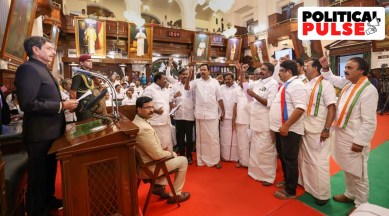DMK govt’s object of ire: Who is Tamil Nadu Governor RN Ravi?
Since he took charge in September 2021, the Governor has had frequent run-ins with the MK Stalin-led government. On Monday, the relations between the two sides hit a new low as the Governor walked out of the Assembly.

The stand-off between Tamil Nadu Governor RN Ravi and the ruling DMK took a new turn earlier this year as Ravi walked out of the Assembly after Chief Minister MK Stalin asked the Speaker to take on record only the speech prepared by the state government and remove portions added by the Governor. This came days after the ruling party lashed out at the Governor for suggesting that Tamizhagam was a more appropriate name for the state.
The two sides have had a fraught relationship ever since Ravi took charge as Governor in September 2021. Last April, the Stalin government boycotted events organised by Ravi to protest against the alleged delay on his part in clearing several Cabinet recommendations and a dozen Bills passed by the Assembly, including a crucial one seeking the abolition of the National Eligibility Entrance Test (NEET) for medical admissions, and the release of the convicts in the Rajiv Gandhi assassination case.
Last October, the Governor again ruffled the feathers of the state government when he criticised its response to the Coimbatore car bomb blast. “Within hours of the attack, it was clear that it was a terror attack. The materials used indicated a larger conspiracy. I credit the Tamil Nadu Police. But the question is when they cracked the case within hours, why did they take four days to bring in the NIA? … The Tamil Nadu Police did an excellent job. But it is also an instrument… it cannot ask the NIA to come in… those who were supposed to take that call took four days to do that,” Ravi said
The following month, the Secular Progressive Alliance, which includes the DMK, submitted a memorandum to President Droupadi Murmu, asking her to dismiss Ravi. It attached a list of 20 Bills awaiting the Governor’s assent. When a Governor, an unelected figure, opposes a popularly elected state government, it becomes a “constitutional perversion”, it stated.
A former IPS officer, Ravi retired from service in 2012. He served as chairman of the Joint Intelligence Committee and was later Deputy National Security Advisor of India. But his most high-profile assignment has been the Centre’s interlocutor for the Naga peace talks. In August 2015, the NSCN(IM) signed a framework agreement with the Centre for the Naga Peace Accord and Ravi was appointed the interlocutor to take the talks to their conclusion. While both the government and the Naga groups said the talks successfully concluded on the government’s deadline of October 31, 2019, no accord was signed, and relations between Ravi and the NSCN(IM) unravelled. The NSCN(IM) has blamed Ravi for the talks going off track.
It was in this context that Ravi came to Tamil Nadu, with critics saying his allegedly confrontational nature wouldn’t go well with the constitutional post he was to hold. A month after taking charge, Ravi’s demand for state departments to submit presentations on the implementation of schemes kicked up a controversy. While the Congress and other parties raised strong objections, state Chief Secretary V Irai Anbu stepped in to play down the controversy and called the Governor’s order “routine communication”.
In an editorial, Murasoli, referring to Ravi’s IPS background and his stint in Nagaland, wrote, “This is not Nagaland, but Tamil Nadu… Perhaps intimidating tactics are required for the police department and may be helpful on many occasions. But in politics, he should realise that such tactics will not help him achieve anything.”